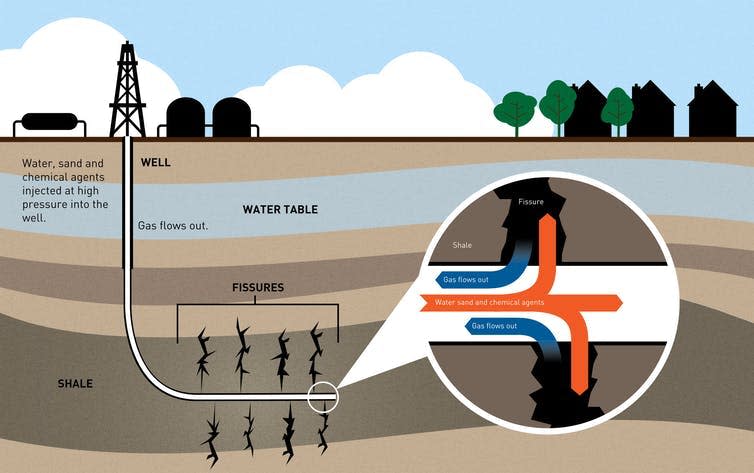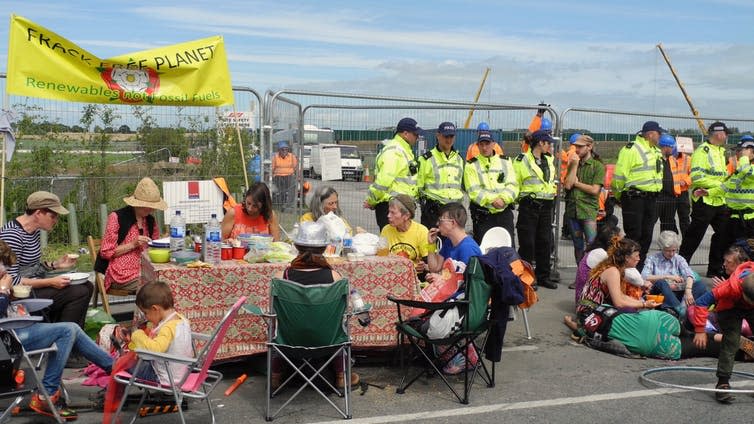UK government's fracking 'ban' has a convenient loophole
With a general election underway, Boris Johnson, the UK prime minister, recently announced that fracking has been halted in the UK – but a closer look at this moratorium covers reveals a loophole. The suspension applies in the north of England, but the smallprint reveals that similar fossil fuel exploration in many traditionally safe Conservative constituencies in south-east England will be just as open for business as before.
The term fracking (from “hydraulic fracturing”) has come to describe a range of methods of drilling for oil and gas that are more correctly known as unconventional extraction. These are techniques reserved for oil and gas that is hard to access. Fracking – the injection of sand, water and toxic chemicals at high pressure to widen small fractures in shale rock, releasing trapped gas or oil – is just one of them.
The government’s moratorium makes clear that fracking in Lancashire is a no-go. After government agency the Oil and Gas Authority reported that it was not possible to predict the probability or size of tremors from fracking, Cuadrilla’s operations at the now infamous Preston New Road site – which caused a magnitude 2.9 earthquake – are no longer lawful. The same is true for other fracking sites in earlier stages of development in Yorkshire and Nottinghamshire.

But the north of England is not the only region in the UK that unconventional exploration for oil and gas is afoot. In the rolling hills south-west of London, work is also underway to extract gas and oil using similar methods. At numerous sites in Surrey and Sussex, companies are in the process of – or are planning to – inject acid in boreholes to widen fractures in the rock below.
This may be at a low pressure (a technique termed acidisation) or a higher pressure (acid fracking). But, crucially, both of these techniques tend to use pressures lower than the threshold at which the government’s moratorium outlaws fossil fuel extraction. So, fossil fuel exploration in south-east England usually encompassed under the term “fracking” is in fact exempt from this “ban”.
Similar to the opposition to fracking in Lancashire, many local residents in Surrey have expressed serious concern at earthquakes as strong as magnitude 3.2 in the area. Researchers at the British Geological Survey and Imperial and Bristol universities ruled out a link to oil and gas exploration, but the earthquakes alone indicate that there are faults, or cracks, underground that could potentially be further destabilised by fossil fuel extraction. As such, there is strong local opposition to the operations.
Interestingly, the constituencies surrounding these sites are largely safe Conservative seats that are expected to be held relatively comfortably. In contrast, Leave-voting seats in the North are key targets for the Conservatives this election.

The party may struggle to reverse its distant second to Labour in the constituency of Preston itself, which houses the epicentre of local resistance to fracking in the Preston New Road protest camps. But in a region largely opposed to fracking, the ban may well be a boost to efforts to win over the so-called “Workington Man” – older, white, Leave voters who could be tempted to deviate from their usual Labour leanings.
Read more: Can the Conservative Party win in the North of England?
Consistent with the notion that government policy on domestic fossil fuel production is aimed at winning votes rather than a desire to cut emissions, it has just approved the opening of the Woodhouse Colliery coal mine. The mine sits in the Cumbrian constituency of Copeland, where the Conservatives hold a marginal lead over Labour and the Liberal Democrat vote barely registers. Importantly, unlike the broad opposition or ambivalence to fracking, the promise of new jobs from the coal mine has helped build local support.
Deliberately or not, the current party of government’s “ban” on fracking hears local opposition in seats it is targeting in the north of England, but ignores similar opposition to unconventional extraction in its southern strongholds. Whether this will help the government to remain in their position come election day remains to be seen.

This article is republished from The Conversation under a Creative Commons license. Read the original article.

Keith Baker is a Co-founder of the Energy Poverty Research initiative; a member of the Energy Working Group within the Scottish 'think and do tank' Common Weal; a member of Scientists for Global Responsibility; and a member of the Green Party of England and Wales.
Peter Styles does not receive funding from anyone. He has in the past received Grants from European and UK governments, energy companies, and environmental groups.

 Yahoo News
Yahoo News 
